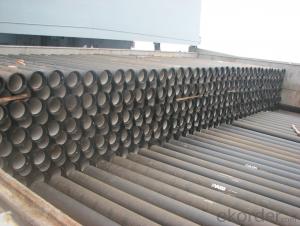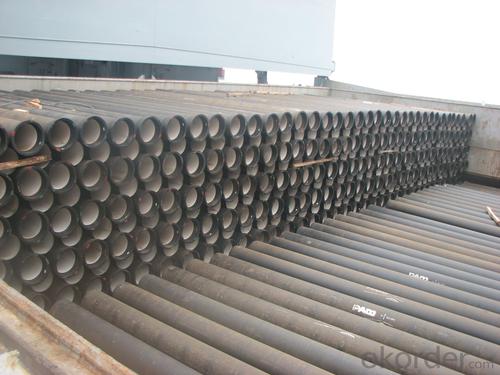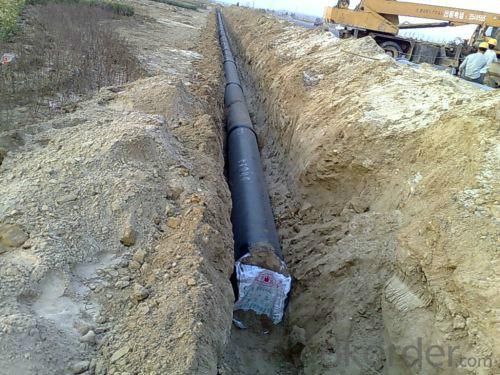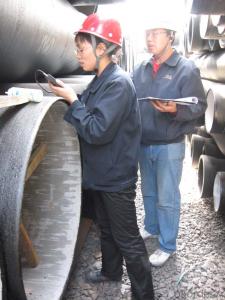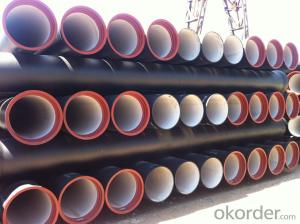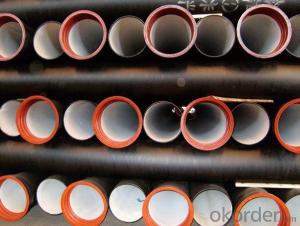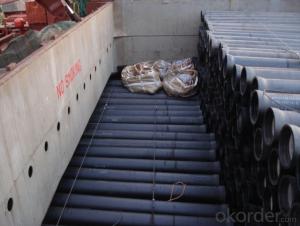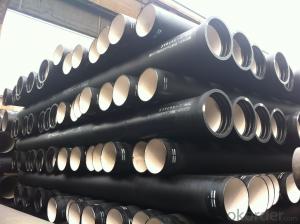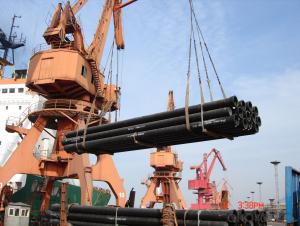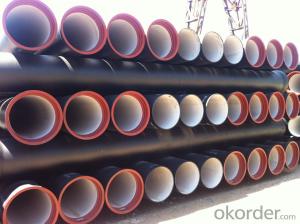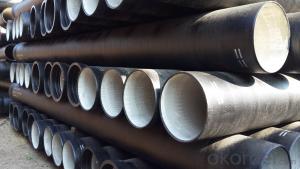Ductile Iron Pipe ISO2531/EN545/EN598 ClassC DN200-DN900
- Loading Port:
- China main port
- Payment Terms:
- TT or LC
- Min Order Qty:
- 25 m.t.
- Supply Capability:
- 200000 m.t./month
OKorder Service Pledge
OKorder Financial Service
You Might Also Like
1,Ductile Iron Pipe Description :
DI pipe fittings are manufactured according to ISO 2531 or BS EN545 or BS4772 FOR POTABLE WATER ,internal is cement lining or wet epoxy coating;External is zinc plus bitumen or wet epoxy coating. We also manufacture ductile iron fittings with fusion bonded epoxy both inside and outside. All the producets are sutible to water pipes fields.We have passed ISO9001,ISO14001,OHSMS18001 certificate.
2,Main Features of the Ductile Iron Pipe:
•High yield strength
•High tensile Strength
•High corrosion resistance
•Pressure Resistence
•Anti-corrosion
•Installation is convenient
•Satisfy the highest hygienic standards
• Mechanical testing after heat treatment
• Final NDE,dimension inspected
• Full Q.A document as per client request
• standard export package(carton/wooden case/pallet)
• accept FOB,FAS,CNF,CIF door to door etc or customer designated shipping agent
• Inspection: inspect in house, all our products must be checked 3 times before packing
3,Ductile Iron Pipe Images:
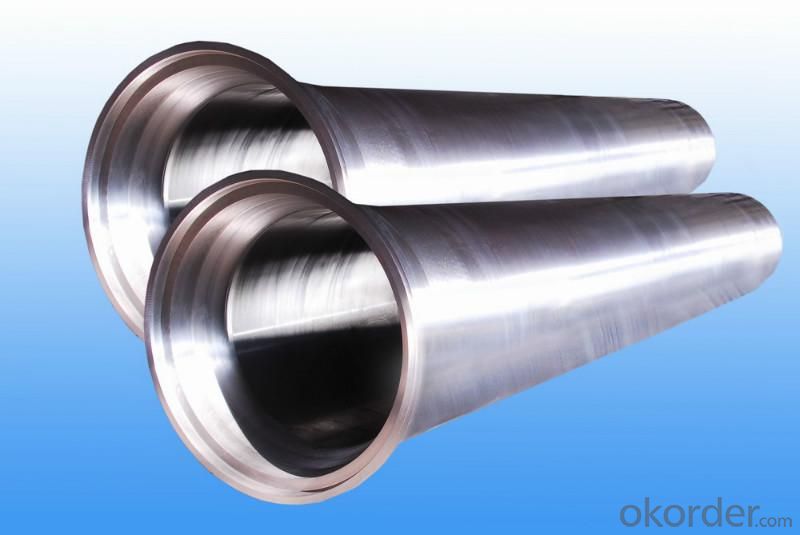
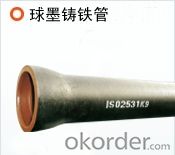
4. Ductile Iron Pipe Specification:
Surface Finishes: Bare, Oiled, Mill Varnish, Galv,FBE, FBE Dual, 3LPE, 3LPP, Coal Tar,Concrete Coating and Tape Wrap
End Finishes: Beveled, Square Cut, Threaded, hat
Additional Services: Internal Coating
Packaging: packed in bag, plastic bag, steel strip, steel wire,double wire, iron box, wooden box, tarpaulin, plastic sheeting
Inspection: MOODY SGS BV GL DNV ABS LIOYD’S
Test: X-ray, UT, magnetic particle,inspection,hydrostatic test.
Processing service: Beveling, Threading, Slotting, Cut-to length, Bends, Quench and Temper, Fabrication, Double-jointing and On-site assistance
Documentary: MTC, material certification,Origin certification, CI or PI,Test Report, export licence, handling order, B/L,insurance policy,shipping instructions, contract, packing list etc.
5.FAQ:
We have organized several common questions for our clients,may help you sincerely:
1.Q: Why would you choose ductile iron pipe rather than other pipe materials?
A:The reasons are obvious for that not only ductile iron pipe possesses the inherent strength and flexibility of ductile iron, combined with proven corrosion protection systems, but also the cost savings can be achieved from design to installation and commissioning.
2.Q:Why can you guarantee the inner of pipes can’t be corroded?
A: High alumina cement mortar lining and sulphate-resistant cement mortar lining. These two special linings are applicable to inner anti-corrosion for sewage pipes, improving resistance to erosion of the sewage components.
- Q: Can ductile iron pipes be used for water supply in remote areas?
- Yes, ductile iron pipes can be used for water supply in remote areas. Ductile iron pipes are known for their strength and durability, making them suitable for various applications, including water supply systems. Their resistance to corrosion and ability to withstand high pressure make them a reliable choice for transporting water even in remote areas where maintenance and accessibility may be challenging.
- Q: What's the difference between cast iron pipe and steel pipe?
- Steel tube (Steel pipe) production technology development began in the bicycle manufacturing industry, the rise of the early nineteenth Century during the oil development, the two world war ships, boilers, aircraft manufacturing, manufacturing of power boiler after the Second World War, the development of chemical industry of petroleum and natural gas drilling and transportation, will effectively promote the the yield and quality of varieties, the development of steel tube industry.
- Q: Are ductile iron pipes resistant to acid attacks?
- Yes, ductile iron pipes are generally resistant to acid attacks. Ductile iron has a protective layer of graphite and a dense matrix structure that helps in preventing the penetration of acid. However, prolonged exposure to highly corrosive acids or extreme pH levels may still cause some degradation over time.
- Q: Maximum pipe diameter of ductile iron pipe
- What I know is that the new ductile iron pipes can reach 2400MM, which can be checked by the official website
- Q: Can ductile iron pipe be used for mining applications?
- Certainly, mining applications can make effective use of ductile iron pipe. Ductile iron, a type of cast iron, possesses impressive tensile strength, flexibility, and durability, rendering it well-suited for rugged and demanding environments like mining. Its high strength-to-weight ratio allows for easy handling and installation, making it a cost-effective option for mining operations. Not only are ductile iron pipes resistant to corrosion, but they also exhibit excellent mechanical properties, including high impact and fatigue resistance. These properties make them ideal for the transportation of various materials commonly found in mining, such as water, slurries, and abrasive ores. Additionally, ductile iron pipes boast a lengthy lifespan, ensuring reliable performance and minimal maintenance requirements in mining operations. Moreover, ductile iron pipes endure high pressures and maintain their integrity even under extreme conditions, thus qualifying them for underground mining applications. They can handle the rigorous demands of deep mining operations, including the conveyance of water for cooling or dust suppression, as well as the drainage of wastewater or mine dewatering. On the whole, ductile iron pipes provide the necessary strength, resilience, and corrosion resistance required for mining applications. Their versatility, durability, and ease of installation make them a valuable choice for mining operations, guaranteeing efficient and reliable material transport while reducing downtime and maintenance costs.
- Q: Can ductile iron pipes be used for water tunnel crossings?
- Indeed, water tunnel crossings can utilize ductile iron pipes. Renowned for their robustness, longevity, and immunity to corrosion, ductile iron pipes prove to be an ideal option for diverse purposes, including water tunnel crossings. Their ability to endure immense pressure, external burdens, and soil movements, commonly experienced in tunnel crossings, is commendable. Moreover, ductile iron pipes boast an extended lifespan and necessitate minimal upkeep, rendering them an economical resolution for water tunnel crossings.
- Q: How do ductile iron pipes perform in seismic zones?
- Ductile iron pipes have proven to perform exceptionally well in seismic zones due to their unique characteristics and design features. These pipes are known for their ability to withstand ground movements, vibrations, and other seismic forces that may occur during an earthquake. The inherent flexibility of ductile iron pipes allows them to absorb and distribute the energy generated by seismic activities. This flexibility helps prevent the pipes from fracturing or breaking under intense ground shaking. Additionally, the high strength and resilience of ductile iron make it highly resistant to damage caused by ground movements. Furthermore, ductile iron pipes are designed with restrained joints, which provide added stability and resistance to seismic forces. These joints can accommodate small lateral movements without compromising the integrity of the pipeline system. The restrained joints also prevent the pipes from becoming disconnected or misaligned during seismic events, ensuring the continuous flow of water or other fluids. In seismic zones, where the ground is more prone to liquefaction or soil settlement, ductile iron pipes are often installed using methods that enhance their stability. For instance, the use of deep embedment techniques or the incorporation of thrust blocks at bends and fittings increases the resistance of the pipes to the lateral forces exerted by the ground. The performance of ductile iron pipes in seismic zones is further enhanced by regular inspection and maintenance. Periodic assessments can detect any potential weaknesses or damages that may have occurred during seismic events, allowing for timely repairs or replacements to be made. Overall, ductile iron pipes have a proven track record of reliable performance in seismic zones. Their flexibility, strength, and design characteristics make them highly resilient to seismic forces, ensuring the safe and uninterrupted supply of water or other fluids even in areas prone to earthquakes.
- Q: Can ductile iron pipe be used in areas with high groundwater levels?
- Yes, ductile iron pipe can be used in areas with high groundwater levels. Ductile iron is known for its durability and corrosion resistance, making it suitable for underground applications including areas with high groundwater levels.
- Q: Are ductile iron pipes suitable for use in industrial applications?
- Yes, ductile iron pipes are suitable for use in industrial applications. They have excellent strength and durability, making them ideal for transporting water, chemicals, and other fluids in industrial settings. Ductile iron pipes are also resistant to corrosion, which is crucial for maintaining a long lifespan in industrial environments. Additionally, their flexibility and ease of installation make them a cost-effective choice for industrial applications.
- Q: What is the expected flow capacity of ductile iron pipes?
- The expected flow capacity of ductile iron pipes can vary depending on several factors such as the diameter and wall thickness of the pipe, the type of fluid being transported, and the specific design and condition of the pipeline system. Generally, ductile iron pipes are known for their high flow capacity due to their smooth internal surface which minimizes frictional losses. They are designed to handle a wide range of fluid flows, including water, sewage, and industrial fluids. In terms of specific flow rates, it is common to refer to the Manning's equation, which is widely used to calculate the flow capacity of open channels and pipes. This equation takes into account the hydraulic radius, slope of the pipe, and Manning's roughness coefficient to determine the expected flow capacity. However, it is important to note that the actual flow capacity can also be influenced by other factors such as the presence of fittings, valves, and bends in the pipeline, as well as any potential blockages or obstructions. Therefore, it is recommended to consult the manufacturer's specifications, engineering guidelines, or work with a qualified engineer to accurately determine the expected flow capacity of ductile iron pipes for a particular application.
Send your message to us
Ductile Iron Pipe ISO2531/EN545/EN598 ClassC DN200-DN900
- Loading Port:
- China main port
- Payment Terms:
- TT or LC
- Min Order Qty:
- 25 m.t.
- Supply Capability:
- 200000 m.t./month
OKorder Service Pledge
OKorder Financial Service
Similar products
Hot products
Hot Searches
Related keywords
